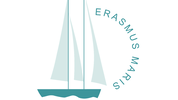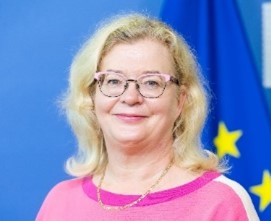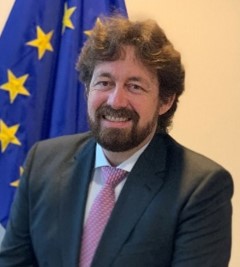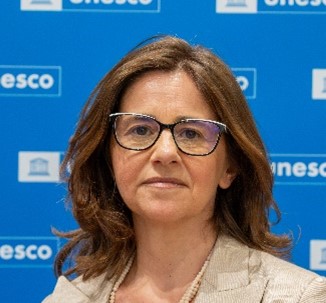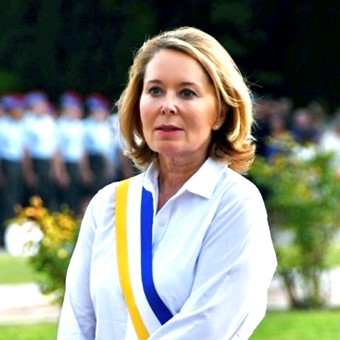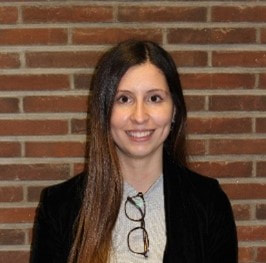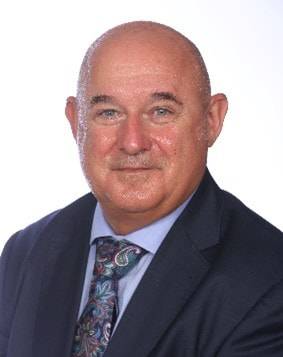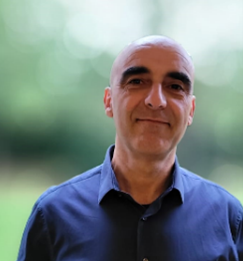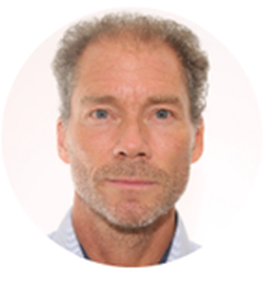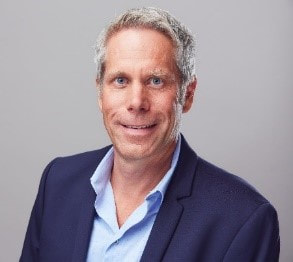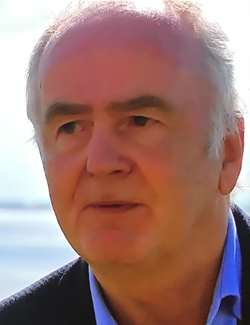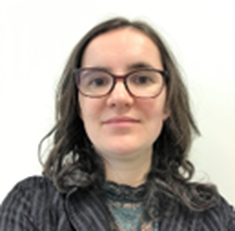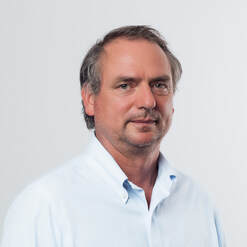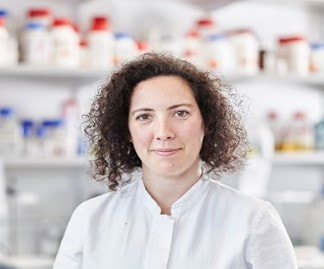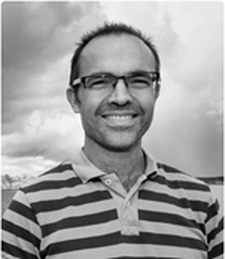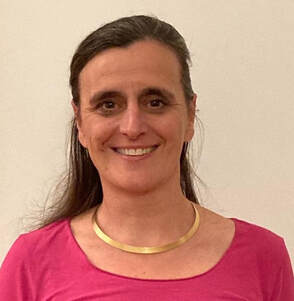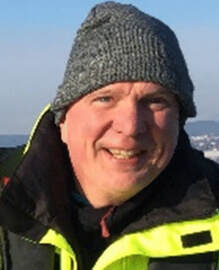|
Salla Saastamoinen, Deputy Director General, European Commission, Joint Research Centre
Salla Saastamoinen is Deputy Director-General in Directorate-General Joint Research Centre (JRC) at the European Commission. Salla Saastamoinen has worked in the European Commission since 1996, first in DG Environment and then in several areas in DG Justice and Consumers. Before joining the Commission, Ms Saastamoinen was a partner in a law office in Helsinki, Finland. She has a licentiate degree in law (post-graduate level) from the University of Helsinki, Finland, and post-graduate studies in law from the universities of Saarbrücken, Germany and Zürich, Switzerland. She is author of several books on environmental law and EU law |
|
Robert Koeber, Head of Unit, European Commission, Joint Research Centre, JRC, Directorate for Food and Health, Belgium
Robert Koeber is the Head of Unit of the Reference Materials Unit at the JRC that is in charge of the development, production and distribution of the European Commission’s non-nuclear reference materials. R. Koeber obtained a doctor’s degree from the Technical University of Munich in Analytical Chemistry and a master degree in Chemistry from the University of Munich. His background includes environmental and pharmaceutical analysis and quality assurance. |
|
Francesca Santoro, Senior Programme Officer- Intergovernmental Oceanographic Commission (IOC) of UNESCO, Italy
Francesca Santoro works for the Intergovernmental Oceanographic Commission (IOC) of UNESCO where she leads of the ocean literacy programme , she also coordinates the Ocean Literacy With All Programme of the UN Ocean Decade. Francesca holds a MSc in Environmental Sciences, a Master in Science Communication, and PhD in analysis and governance for sustainable development from the School for Advanced Studies in Venice (SSAV) with specialization in marine environmental sciences and marine governance. Francesca joined UNESCO in 2011, and before she worked as lecturer for the University Ca' Foscari of Venice. She worked as well for several international research centers such as the Euro-Mediterranean Centre for Climate Change, the International Marine Centre, and Italian National Council for Research. |
|
Anne Rudisuhli, European Committee of the Regions (CoR) - Commission for Social Policy, Education, Employment, Research and Culture (SEDEC)Robertson-Rudisuhli worked in publishing houses for 20 years before becoming a psychotherapist.
In 2021, she was elected for her first term as Councillor of the Bouches-du-Rhône Department under the political party Renaissance ( ex La République en Marche). As part of her mandate, she is in charge of European Affairs. For Renaissance, in the Departement des Bouches-du-Rhône, she is in charge of European Affairs. Since 2022, she is also a Member of the European Committee of the Regions where she acts as Renew coordinator for the SEDEC commission. |
|
Sandra Castañer, Policy Officer, European Commission, Directorate-General for Maritime Affairs and Fisheries, MARE, Belgium
Sandra Castañer was born and raised in the beautiful Costa Brava in northeast Spain. She holds a bachelor’s degree in international business economics and a master’s degree in sustainable tourism management. After stays abroad in the USA, Denmark, and Slovenia during her studies, she moved to Brussels to pursue a career in European and international affairs. Sandra is currently a policy officer at the European Commission’s Directorate-General for Maritime Affairs and Fisheries, responsible for blue skills and ocean literacy. The conservation and sustainable use of our ocean is a cause that is close to her Mediterranean heart. |
|
Manuel Bordoy, Deputy Secretary General, Office of the Secretariat-General of the European Schools (ES-OSG), Belgium
Manuel Bordoy holds a Bachelor Degree in Anglo-Germanic Philology and a Master's degree in the teaching of foreign languages (English / French), both awarded by the University of Valencia (Spain). He completed postgraduate studies in Translation and Interpretation at the Universities of Valencia and at the Jaume I University of Castellón (Spain). He also followed postgraduate studies at the department of Didactics of Language and Literature at the University of Murcia (Spain) within the program of Didactics of Languages and their Cultures. He was a Deputy Director at the IES Francisco Ribalta in Castellón, a Teacher Trainer for secondary school foreign language teachers at the in-service training centres CEP in Valencia and CEFIRE in Castellón. He also taught at the Polytechnic University of Valencia (1989-1998) and was an education adviser attached to the Spanish Embassies in Denmark and the Netherlands (1998-2003). He came in the European School system as a as Deputy Director of the secondary cycle at the European School Mol, Belgium (2003-2008) then he transferred to the same position into the European School of Alicante, Spain (2008-2013) He was Provincial Vice-President of the Spanish Red Cross in Alicante (2012-2014) as a volunteer |
|
Kamel Labibes, Ph.D., Ayam Sailing Europe AISBL (ASE)
Kamel Labibes is the Founder and Chairman of Ayam Sailing Europe, an NGO dedicated to youth empowerment through sailing. With a background in science, he has extensive involvement in large-scale research projects spanning various disciplines and EU countries. Kamel Labibes is the initiator of the citizen science initiative Erasmus Maris. He led and coordinated the pilot projects in which the Erasmus Maris concept was tested and demonstrated, addressing the critical issue of microplastic pollution. |
|
Evy Copejeans, Managing Director, European Marine Science Educators Association.
Evy is the cofounder and managing director of EMSEA, leading the EU projects components on blue education such as in the EU4Ocean Network of European Blue Schools, Bridge-BS and Ocean Literacy with All (a UN Decade program). She is an experienced education consultant, having created education projects and professional development workshops focused on bringing the ocean to the classroom. Previously she worked 13 years as a senior Science Communication Officer at the Flanders Marine Institute (VLIZ), Ostend, Belgium. After graduating as a geography teacher, she was rewarded with the prize for best thesis `The North Sea, Mare Incognitum´, which highlighted that the ocean was hardly mentioned in the geography curriculum and advising policy makers how to revise it, a work that is still ongoing. She is co-author of several public outreach articles and education publications, including the first textbook in Dutch on marine science for teachers: 'The Science of the Sea - De Wetenschap van de Zee' |
|
Patrick Gorringe, Manager, International Ocean Relations Swedish Meteorological and Hydrological Institute (SMHI)
MSc, Physical oceanographer, responsible for International Ocean Affairs at SMHI, the Swedish Meteorological and Hydrological Institute. Patrick has a passion for ocean observing, its applications, platforms and networks. Patrick acts as the oceanographic national contact point for a number of Swedish and international governmental bodies and institutes. Patrick has worked for EuroGOOS AISBL, Sweden/Brussels and IMOS/AODN in Australia and devoted a lot of his work bringing together marine communities in order to enhance the cooperation and by this increase the accessibility to marine data. He is a member of a number of advisory boards and expert groups such as the Inter-Programme Expert Team on Integrated Marine Meteorological and Oceanographic Services within WMO and IOC Information Systems (IPET-MOIS). Patrick is also involved in projects related to marine data and data management such as EMODnet (Deputy-Coordinator of EMODnet Physics), SeaDataCloud, Copernicus and other initiatives related to marine data management and dissemination of data on European and Global scales. Patrick was the Swedish representative to WMO-IOC Joint Committee for Marine Meteorology (JCOMM) and acts as the head of the Swedish delegation of the Intergovernmental Oceanographic Commission of UNESCO (IOC-UNESCO) and is the National contact point for GOOS and EuroGOOS. |
|
Håkan Emteborg, Scientific / Technical Project Manager, Joint Research Centre
Håkan Emteborg has a PhD in analytical chemistry from Umeå Unversity, Sweden. In 2003, he joined the Reference Material Unit at the Joint Research Centre in Geel, Belgium where he is managing the Reference Material Production Laboratory. His main research interests are focused on the development of new innovative types of reference materials and process analytical techniques. During the last years, microplastics Reference Materials have been among such innovative materials developments encompassing both processing techniques and measurement techniques. |
|
Jacob De Boer, VU, The Netherlands
Jacob de Boer is emeritus professor. From 2006-2022 he was Professor of Environmental Chemistry and Toxicology at the Vrije Universiteit Amsterdam, The Netherlands. He obtained a PhD in analytical chemistry at the Vrije Universiteit in 1995. Prof. De Boer has worked for 49 years on the environmental contamination and analysis of persistent organic contaminants. In 1998 he won the Excellent Scientist Award of the Wageningen University. In 2015 he was honoured as one of the most cited scientists in his field (Top 1%) according to Thomson & Reuter. He has (co)coordinated a large number of European research projects, and many research projects for other international organisations and industries. He has published 250 peer reviewed articles among which one paper in Nature and one in Science, two books and 21 book chapters. His H-index is 62. He is editor-in-chief of Chemosphere (Impact factor 8.8) and member of the editorial board of the Handbook of Environmental Chemistry. |
|
Jana Asselman, University of Ghent, Belgium
Prof. Dr. ir. Jana Asselman is the head of the Blue Growth Research Lab. She coordinates the multidisciplinary UGent research facilities located at Ostend Science Park. Her research interests include marine biotechnology, biodiscovery of marine natural products, nano- and microplastics, sustainable aquaculture, molecular and in vitro toxicology and broad human and environmental health challenges associated with the blue economy. Prof. Dr. ir. Asselman has expertise in marine natural product discovery in sea spray. She also has experience with human and environmental health effects of chemical pollution, including micro- and nanoplastics. |
|
Andrej KRŽAN, National Institute of Chemistry in Ljubljana Slovenia
Prof. Andrej KRŽAN, holds a PhD in chemistry from Georgetown University, Washington DC. He is a senior scientific associate at the National Institute of Chemistry in Ljubljana Slovenia and lecturer at the University of Nova Gorica. His entire career has been devoted to sustainability issues of plastics – from recycling to biodegradable and biobased plastics as well as plastic pollution including microplastics. He has coordinated several international projects supporting the development and use of sustainable solutions in plastics and the establishment of connections and capacity in participating countries. More recently, he co-founded a start-up company PlanetCare devoted to providing solutions for the reduction of microplastic fibre pollution from washing. |
|
Ana Catarino, VLIZ, Belgium
Dr Ana Isabel Catarino is a senior researcher at the Flanders Marine Institute (VLIZ, Belgium). She currently leads the research team focusing on Plastics in Local and Global Waters, exploring the impact of plastic pollution on marine ecosystems. Dr Catarino joined VLIZ in 2019, an interdisciplinary institute collaborating closely with academia, policymakers, educators, and the public in marine and coastal sciences. Her research primarily investigates the impact of human activities on aquatic organisms, with a particular emphasis on understanding the combined effects of microplastics and climate change stressors. Her work involves identifying and quantifying plastic particles in various components of marine ecosystems, including seawater, sediments, and biota, to assess organisms’ exposure and risks. Dr Catarino is engaged in citizen science initiatives, such as in the project COLLECT (POGO) and Plastic Pirates (Horizon Europe), to raise public awareness of plastic pollution, and she is interested in evaluating solutions for environmental litter removal. Additionally, her current research investigates the combined ecotoxicological impacts of nano-microplastics and other environmental stressors on marine organisms. She is an active member of the Society of Environmental Toxicology and Chemistry (SETAC), and she is part of Native Scientists, a volunteer-based network of scientists dedicated to addressing educational disparities through science outreach. You can find her on X at @Zebrazuli. |
|
Martin Hassellöv, Department of Marine Sciences, University of Gothenburg (GU), Sweden
Prof Martin Hassellöv has a background in the role of particles in transport and bioavailability of metals in aquatic systems (limnic, marine and urban waters and sediments). His expertise in natural colloids has progressed into the environmental risk research of synthetic nanomaterials, where characterization, analysis and studies of fate and transport have been his own focus areas. More recently he is building up a research group focusing on marine micro- and nano-litter, including but not limited to microplastic particles |
|
Braun, Ulrike, German Environment Agency (UBA), Germany
Dr Ulrike Braun's background is in chemistry, and her research area revolves around the analysis of molecular degradation mechanisms of polymers, with a focus on understanding the thermal, chemical, and mechanical stability of these materials. In addition to various topics related to polymer stabilization, she has dedicated the past few years to developing new methods for characterizing microplastics in the environment and integrating them into standardization processes. For nearly 20 years, Ulrike Braun worked at the Federal Institute for Materials Research and Testing in Berlin. Since 2021, she has held the position of the head of the "Waste Water Analysis, Monitoring Methods" unit at the German Environment Agency. |
|
Bert Van Bavel, Norwegian Institute for Water Research (NIVA), Norway
Professor and chief Scientist at NIVA and an internationally leading researcher in the field of chemical analysis of environmental pollutants and quality control. He is currently Coordinator of the EU H2020 project EUROqCHARM (European Quality Controlled Harmonization Assuring Reproducible Monitoring and Assessment of Plastic Pollution). |
